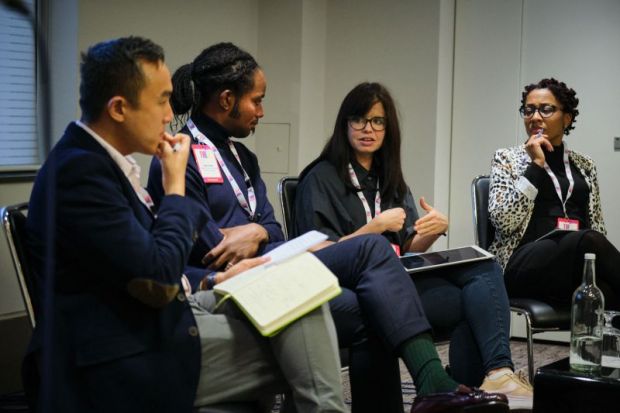UK universities must be forced into improving diversity because without extra impetus, the pace of change will continue to be too slow, according to experts.
Nicola Rollock, reader in equity and education at Goldsmiths, University of London, said she was “frustrated by the higher education sector” because it was “really slow and behind” on improving diversity and tackling inequality, particularly in relation to race.
Dr Rollock, speaking on a panel at Times Higher Education’s THE Live, said: “I don’t think the goodwill of the sector is enough with these issues – it needs to be mandated.”
The recent Equalities and Human Rights Commission report on racial harassment “drove home the painful and shameful extent of racism faced by students and faculty of colour” at UK universities, Dr Rollock said. She added that these problems have been around for decades and yet there has been little improvement. “This is 2019, when universities have a duty to ensure equality,” she said.
Dr Rollock pointed out that the English regulator, the Office for Students, “has targeted the degree awarding gap and we have seen a flurry of activity”. However, she warned, not all universities seemed to have understood that equality involves more than “just what is written on the page, but who is teaching, what content is taught, how interactions are managed, the contacts outside of the lecture, and what social events are like” for minority students.
She pointed to the effect that financial gains had on behaviour, particularly in the case of the research excellence framework. “You see where we channel our resources and time when there are particular returns on investment for us,” she said.
Jess Wade, research associate at Imperial College London, who was also speaking on the panel, agreed. She pointed to the impact that the Athena SWAN equality charter had had on female representation, particularly in science. “When it was made compulsory for getting funding for medicine, there was a spike [in efforts to boost female careers]. That kind of incentive means people commit time – and money – towards it.”
Dr Wade continued: “We collect all these facts – universities must have databases of full of information on racial harassment, sexual harassment – and no one acts. So we can keep collecting data all we want, but it will sit there until someone comes up with a code of conduct and tells us what’s next.”
Scholars have previously called for the UK sector’s Race Equality Charter to be tied to funding. Another suggestion is to extend Athena SWAN to cover inequality tied to ethnicity as well as gender.
Jason Arday, assistant professor in sociology at Durham University, told the panel that senior leaders would have to take more responsibility for diversity because they were currently too disconnected from the issues.
“I would suggest senior leaders have to take accountability; they have almost been absolved of their responsibility. Students experience harassment, they are reported and vice-chancellors are able to keep their jobs,” he said.
anna.mckie@timeshighereducation.com
Join the THE Live mailing list here for all the latest THE Live news and exclusive offers.
Register to continue
Why register?
- Registration is free and only takes a moment
- Once registered, you can read 3 articles a month
- Sign up for our newsletter
Subscribe
Or subscribe for unlimited access to:
- Unlimited access to news, views, insights & reviews
- Digital editions
- Digital access to THE’s university and college rankings analysis
Already registered or a current subscriber? Login








